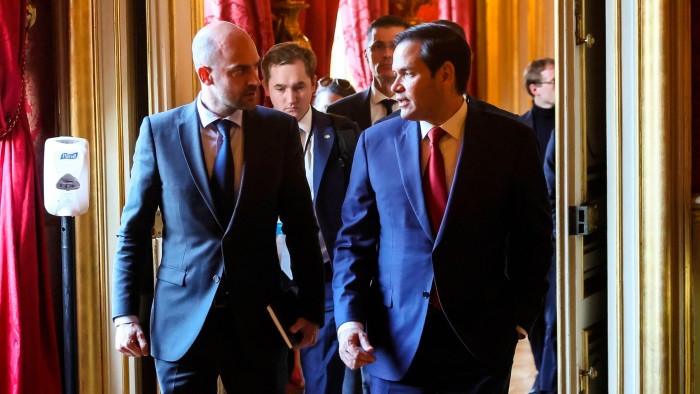
Trump Ukraine Peace Talks Deadline: Administration Sets "Days Not Weeks" Ultimatum | Foreign Policy Analysis
Trump Ukraine Peace Talks Deadline: Administration Sets “Days Not Weeks” Ultimatum
Table of Contents
- Trump Ukraine Peace Talks Deadline: Administration’s Ultimatum
- The Short Timeline for Diplomatic Breakthrough
- European Partners Taking Larger Role in Negotiations
- Resource-Sharing Agreement: A Limited Sign of Progress
- Security Guarantees Remain Major Unresolved Issue
- Timeline: The Trump Administration’s Ukraine Peace Efforts
- Implications for US-Ukraine Relations
- Analysis: What the Trump Ukraine Peace Talks Deadline Means
US Secretary of State Marco Rubio (right) with French Foreign Minister Jean-Noël Barrot after high-level talks in Paris on Thursday to discuss the Russia-Ukraine peace negotiations. © Thomas Padilla/AP
Trump Ukraine Peace Talks Deadline: Administration’s Ultimatum
President Donald Trump’s administration has issued a stark ultimatum regarding Russia-Ukraine peace negotiations, with Secretary of State Marco Rubio declaring that Washington will abandon diplomatic efforts within “a matter of days” unless clear signs of progress emerge. This Trump Ukraine Peace Talks deadline represents a significant hardening of the administration’s stance following high-level talks in Paris and signals potential major shifts in US policy toward the ongoing conflict.
Speaking to reporters on Friday, Rubio delivered an unambiguous message that the Trump administration has no intention of pursuing fruitless diplomatic efforts for “weeks or months” and would pivot to “other priorities” without a breakthrough soon.
“If it’s not possible, if we’re so far apart that this is not going to happen, then I think the president is at a point where he is going to say, well, we’re done. We’re not going to continue to fly all over the world and do meeting after meeting after meeting if no progress is being made.”
This Trump Ukraine Peace Talks deadline comes after Thursday’s day-long meeting in Paris hosted by French President Emmanuel Macron. The high-level gathering included a US delegation led by Rubio and special envoy Steve Witkoff, alongside officials from Ukraine, the United Kingdom, and Germany—marking the first time European powers have been directly included in these specific negotiations.
Key Points of the Trump Administration’s Ultimatum:
- The US will evaluate peace talks viability “in days, not weeks“
- President Trump “felt strongly” talks cannot drag on indefinitely
- Next meeting scheduled in London to incorporate Russian input
- European allies taking larger role in facilitating negotiations
- Resource-sharing agreement with Ukraine represents limited progress
The Short Timeline for Diplomatic Breakthrough
The Trump Ukraine Peace Talks deadline establishes an extremely compressed timeline for evaluating whether negotiations can bear fruit. According to Secretary Rubio, the administration wants to determine “in a matter of days, not weeks” if a peace agreement is attainable—a position consistent with Trump’s longstanding criticism of prolonged US involvement in foreign conflicts without clear exit strategies.
Notably, Rubio did not elaborate on what the implications would be for US military support to Ukraine if Trump were to follow through on the ultimatum and abandon the peace effort. This unaddressed question creates significant uncertainty regarding the future of American assistance that has been crucial to Ukraine’s defense against Russian aggression since the conflict began.
The Trump Ukraine Peace Talks deadline approach reflects the administration’s transactional view of foreign policy, where diplomatic initiatives must show measurable progress within defined timeframes or be reconsidered. This philosophy represents a marked departure from previous administrations’ approaches to complex international conflicts, where diplomatic processes were often allowed to develop over extended periods.
European Partners Taking Larger Role in Negotiations
Despite the ultimatum, Secretary Rubio characterized the Paris talks as “very positive” and praised the constructive involvement of European countries in the negotiation process. This suggests that the Trump Ukraine Peace Talks deadline may be partly designed to accelerate European engagement rather than signal a complete US withdrawal from diplomatic efforts.
Rubio indicated that another meeting in a similar format will take place next week in London, allowing the US to incorporate Russian input and for Ukraine to refine its positions. This follow-up meeting will be crucial in determining whether the negotiations can meet the administration’s accelerated timeline.
A French official described Thursday’s gathering as significant because it initiated “a new positive process” in peace talks with enhanced European involvement. Similarly, a British official noted that the discussion felt consequential regarding alignment between the US and European positions on Putin’s apparent lack of commitment to peace plans.
“The UK, France and Germany can help us move the ball on this and get this closer to a resolution,” Rubio acknowledged, signaling that the Trump Ukraine Peace Talks deadline could potentially be met through increased European diplomatic efforts complementing American pressure.
This collaborative Western approach represents a potential evolution in the Trump administration’s typically unilateral foreign policy stance. By incorporating European allies more deeply into the negotiation process, the US may be seeking to share the diplomatic burden while maintaining the pressure of its deadline-focused approach.
Resource-Sharing Agreement: A Limited Sign of Progress
In what appears to be one of the few concrete developments amid the stalled peace process, Ukraine announced on Thursday that it had signed a preliminary agreement with the United States regarding the sharing of its mineral and energy resources. This accord directly addresses a key demand from President Trump, who has consistently framed such resource-sharing as necessary compensation for the billions of dollars in military aid the US has provided to Ukraine.
The signing represents a notable diplomatic achievement within the context of the Trump Ukraine Peace Talks deadline, especially after a previous attempt to finalize the agreement in February was derailed by a reported argument between Trump and Zelenskyy during an Oval Office meeting. The resource-sharing deal suggests that despite the administration’s ultimatum, there are still avenues for pragmatic cooperation between Washington and Kyiv.
This agreement aligns with Trump’s vision of foreign policy as financially beneficial to American interests—a perspective that has shaped his administration’s approach to international relations. By securing access to Ukraine’s valuable resources, the administration can point to tangible returns on America’s investment in Ukraine’s defense, potentially making continued engagement more palatable to Trump’s domestic audience.
The Resource-Sharing Agreement Details:
While specific terms have not been made public, the preliminary agreement reportedly covers Ukraine’s significant reserves of natural gas, lithium, titanium, and other critical minerals. These resources are increasingly important for energy security and advanced technology manufacturing. The agreement likely includes provisions for American companies to receive preferential access to exploration and development rights in exchange for continued US support.
Security Guarantees Remain Major Unresolved Issue
One of the most significant obstacles to achieving a breakthrough before the Trump Ukraine Peace Talks deadline expires is the unresolved matter of security guarantees for Ukraine. Secretary Rubio declined to detail the specific framework that the US has presented during negotiations, noting that it was premature to make definitive decisions on security guarantees, although he confirmed these had been discussed.
Ukraine has consistently pushed for robust security assurances, particularly regarding its ability to build and maintain a strong defensive military capability. European allies have similarly emphasized the critical importance of such guarantees for any sustainable peace agreement.
The complexity of designing security arrangements acceptable to both Ukraine and Russia while aligning with Western interests makes this issue particularly challenging to resolve within the compressed timeline established by the Trump administration’s ultimatum. Any viable security framework would need to address Ukraine’s legitimate concerns about future Russian aggression while acknowledging Moscow’s stated objections to Ukraine’s potential NATO membership.
Finding this delicate balance within days rather than weeks or months presents a formidable diplomatic challenge that could ultimately determine whether the Trump Ukraine Peace Talks deadline results in a breakthrough or a breakdown in negotiations.
Timeline: The Trump Administration’s Ukraine Peace Efforts
The Road to the Trump Ukraine Peace Talks Deadline
Implications for US-Ukraine Relations
The Trump Ukraine Peace Talks deadline raises profound questions about the future of US-Ukraine relations should peace negotiations collapse. While Secretary Rubio stated that if talks fail, the US would simply “move on to other topics that are equally if not more important for the US,” the practical implications for Ukraine’s defensive capabilities and international standing remain unclear.
Several potential scenarios could unfold if the deadline passes without significant progress:
- Reduced Military Support: The administration could scale back military assistance to Ukraine, potentially limiting it to defensive weapons systems rather than the more advanced offensive capabilities provided thus far.
- Diplomatic Isolation: Without active US diplomatic engagement, Ukraine could face increased pressure to accept less favorable terms from Russia.
- European Leadership: European powers might step into the diplomatic void left by a US withdrawal, potentially leading to a more regionally-focused approach to resolving the conflict.
- Transactional Relationship: US-Ukraine relations could shift to a primarily economic focus, centered on the recently signed resource-sharing agreement rather than broader strategic partnership.
The signing of the resource-sharing agreement suggests that regardless of the peace talks’ outcome, the Trump administration is pursuing a dual track of diplomatic engagement and transactional agreements that align with the president’s vision of foreign policy as financially beneficial to American interests.
Analysis: What the Trump Ukraine Peace Talks Deadline Means
The Trump Ukraine Peace Talks deadline represents a pivotal moment in the long-running Russia-Ukraine conflict and offers significant insights into the Trump administration’s foreign policy approach. By imposing such a compressed timeline on complex negotiations, President Trump is applying business-style pressure tactics to international diplomacy—an approach that reflects his background in high-stakes commercial negotiations.
This ultimatum strategy carries both potential benefits and risks:
| Potential Benefits | Potential Risks |
|---|---|
| Could break diplomatic stalemate by forcing parties to clarify positions | May rush negotiations, leading to an unsustainable agreement |
| Signals seriousness to Russia about US willingness to walk away | Could leave Ukraine vulnerable if US diplomatic support withdraws |
| Encourages greater European involvement in finding a solution | Risks appearing as US abandonment of a democratic ally |
| Aligns with Trump’s pledge to avoid endless foreign entanglements | May embolden Russia if perceived as diminishing US commitment |
Critics argue that the Trump Ukraine Peace Talks deadline fails to account for the complex historical, territorial, and security issues underlying the conflict. Diplomatic resolutions to conflicts of this magnitude typically require extended negotiation periods, with multiple rounds of talks addressing interconnected issues.
Supporters counter that the deadline creates necessary urgency in a conflict that has already lasted over three years with significant human and economic costs. They suggest that the administration’s willingness to set clear boundaries on diplomatic investment may actually accelerate progress by eliminating the option of endless, unproductive negotiations.
As the diplomatic clock winds down on Trump’s self-imposed deadline, all eyes will be on next week’s London meeting to determine whether this ultimatum produces a breakthrough or marks the beginning of a significant shift in US policy toward the Russia-Ukraine conflict. The outcome will not only shape the future of Ukraine but will also establish an important precedent for how the Trump administration approaches other complex international challenges.
Looking Forward:
The Trump Ukraine Peace Talks deadline may represent a new phase in American diplomatic approach rather than an endpoint. Even if the current format of negotiations is abandoned, the established resource-sharing agreement and enhanced European involvement create potential avenues for continued engagement. The administration’s ultimate objective appears to be demonstrating tangible progress in resolving international conflicts while securing concrete benefits for American interests—a goal that may be pursued through different means if the current peace process stalls.






